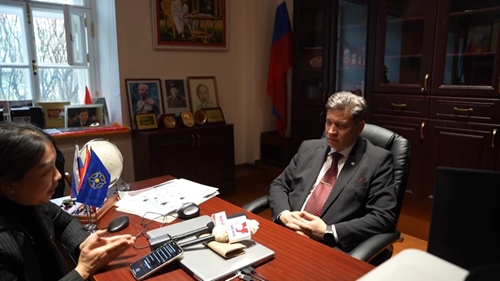In an interview granted to the Vietnam News Agency, Prof. Vladimir Kolotov, head of the Ho Chi Minh Institute at the Saint Petersburg State University, said that in the Dien Bien Phu Campaign, the Vietnamese military had to fight against a stronger, larger, and more modern military, and the commander of the Vietnamese military then – General Vo Nguyen Giap – made use of ingenuity to find out a way to defeat French colonialists.
    |
 |
|
Prof. Vladimir Kolotov, head of the Ho Chi Minh Institute at the Saint Petersburg State University, talks to a VNA correspondent. |
He noted basing on the principle of “knowing yourself and knowing the enemy, in a hundred battles you will never be defeated,” General Giap, an excellent disciple of President Ho Chi Minh, brainstormed a stratagem for beating the enemy.
Kolotov laid a particular emphasis on political struggle as the secret weapon of General Giap, who set up a force of commissars for explaining the justice of Vietnam’s fight so as to persuade and give encouragement to soldiers and people. Thanks to that, the Vietnamese military, from zero, became one securing respect from any enemy.
Another source of the Vietnamese military’s strength was bravery, which could be seen in not only battles but also in the preparations for the campaign from 1953, the Russian scholar noted.
He said every 10 soldiers on the battlefield needed up to a hundred people working in the rear to provide support to them. Facing tough conditions in the midst of mountains and forests and the request for absolute secrecy, Vietnamese soldiers transported all ammunitions to the battlefield on pack-bikes and their own shoulders during nighttime. Food and the injured were also transported safely.
This reflected extraordinary preparations for the campaign, he went on.
The professor held that the Dien Bien Phu Victory created a turning point for the war that resulted in the signing of the 1954 Geneva Accords on the cessation of hostilities in Vietnam, heralding a new chapter in Vietnam’s struggle for national liberation and reunification.
With this victory, Vietnam became an example for many oppressed nations around the world and a source of encouragement for other countries on the path to national liberation, according to Kolotov.
Source: VNA